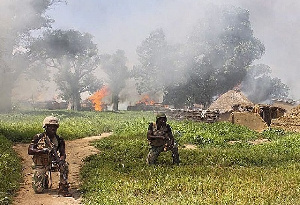Bawku, the capital of the Bawku Municipal Assembly in the Upper East Region, is also the most north-eastern municipality in Ghana, enjoying three diverse cultures.
This, according to historian and lawyer Anokye Frimpong, is the reason the place is sought after for business, beyond the violence that has been associated with it for years.
Explaining the genesis of the conflict that has bedevilled Bawku for many decades, the historian explained that all of it started with an informal arrangement between the original owners of the land, the Mamprusis and the Kusasi people.
He explained, in a GTV Breakfast Show interview, that the newcomers, the Kusasi, were so welcomed that even though there was nothing like a clear-cut, centralised form of leadership, they (Kusasi) appeared to be the ones who were in leadership positions, even when the British came into the country.
“According to R. S. Ratry, the trouble in the area originates from land ownership, or allodial ownership of land, or chieftaincy—these two that bring troubles to areas in particular in the north. When it comes to succession to chieftaincy and land ownership, the landmark has always been who came first, and all historians, anthropologists, sociologists agree that it was the Kusasi people who came first.
“In fact, in the Bawku area, the most dominant ethnic group is the Kusasi, and then the Mamprusi are a very small minority. In fact, originally, they were from Nalerigu, and that means the Mamprusi area – the capital of which is Nalerigu under the Nayiri of Mamprugu.
“Now, these people originated from a very ancient ancestor called Naa Gbewaa. Naa Gbewaa, we are told, came from the Lake Chad area, or Zamfara, in northern Nigeria and settled along the Pusiga area in Ghana. After Naa Gbewaa came, his three sons founded the Mole-Dagbaani kingdom, one of whom is Sitobu. He founded the Dagomba kingdom, and then Tohugo founded the Mamprusi kingdom, and then the Nanumba, which was founded by Gmantombo.
“Now, these people remained where they were until we are told that in the 17th century, the Kusasi people, who were an acephalous society (a society that is not organised under one centralised chief), were threatened by the Busangas from Burkina Faso… Nayiri Naa Tabia brought in troops to assist the Kusasi people. Having assisted them, they felt they had to stay, and so they stationed garrisons in places like Tanja, in Bawku, and then Bindiri,” he explained.
Anokye Frimpong added that along the way after the sons of the Nayiri Naa Tabia established those three kingdoms, they were sent out by their father to rule in certain parts of Bawku.
Still not being very conscious of any overlording form of leadership in their society, the historian explains that the coming of these princes to rule did not actually bother them until it was a little too late.
He also said that when the British came in, that was when things escalated for the two tribes further into the early years of Ghana’s independence.
“This helped them to augment trade, protect the people, and to streamline communication between Bawku and Nalerigu. So, the Nayiri started sending in sons, the princes, to rule the Bawku area. Initially, it didn’t bother the Kusasi people because they felt that they were acephalous; they didn’t care about who was the chief, and then the Mamprusis also restricted their chieftaincy to their own subjects who were trading there.
“So, this was the pre-colonial era, and nobody had a qualm with anyone. So, the relationship was not master-servant, but it was like someone who had given you land to stay on, and you also protect him against external aggression.
“Then, when in 1900, the British entered the place, first of all, they sought to do direct rule for about 30 years, and the Kusasi people did not like it because they hated overlordship; it was alien to them. So, the British, from 1931, decided to organise all these groups under one centralised authority, reminding themselves of their own monarchy back home… and because they could not find leaders among the Kusasis, they felt that the most-centralised people were the Mamprusi people, so they should govern. This was not something they loved… as they imposed the Maprusis upon the Kusasis, and this continued for as long as the British ruled the country…
“…After independence, the Nkrumah government set up the Afari Commission to go into the whole chieftaincy system of the Kusasi-Nanomba people to find out whether the Kusasis were to be encouraged to have their own chiefs so that they’d move from an acephalous society to a chieftaincy society—they governing themselves, or, to make the new overlords; the latecomers, to govern them,” he explained.
 Home Of Ghana News Ghana News, Entertainment And More
Home Of Ghana News Ghana News, Entertainment And More




